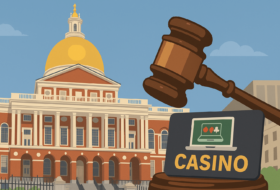
A dozen Pennsylvania online casino “certificates” are available to online casino and poker operators beginning on Tuesday, the Pennsylvania Gaming Control Board (PGCB) announced yesterday. The certificates are available to “casino operators primarily operating in jurisdictions outside of Pennsylvania.”
The last time the PGCB accepted Pennsylvania online casino applications from “qualified gaming entities” without a land-based casino within the Keystone State was in late 2018, the PGCB said. Only one entity made the cut, but even that application is still in process.
A Qualified Gaming Entity has the ability to obtain one or more of the three categories of iGaming certificates that remain available in the Commonwealth and can operate online without having any ties to a Pennsylvania Casino.
The period to petition the PGCB to obtain one of the remaining certificates will begin on January 3, 2023, and run through March 3, 2023.
Online Casino Operators Will Likely Apply
Considering Pennsylvania outpaced all legal US online casino marketplaces in gross gaming revenue (GGR) during November, operators will likely apply for the $4 million certificates. During November, Pennsylvania online casinos generated $156 million in GGR.
Confusingly, the PGCB hasn’t yet pursued multistate online poker revenue. While the state has legal online poker operators, Pennsylvania isn’t yet part of the Multistate Internet Gaming Agreement (MSIGA). Delaware, Michigan, Nevada, and New Jersey are part of that agreement.
So the primary complaint from Pennsylvania online poker players who took to Twitter after learning that Michigan and New Jersey PokerStars players can compete beginning on Jan. 1 was that they couldn’t do so. Yesterday, PokerStars opened registration for the two New Year’s Day tournaments that offer $150,000 in prizes.
The Pennsylvania Process
The PGCB provided a shorthand version of the application process in its announcement:
The 12 remaining certificates, which cost $4 million each, are in the following three categories:
· three certificates for games which simulate slot machines.
· three certificates for bank table games which simulate casino table games played against the house
· six certificates for non-bank table games (generally, poker)
Further application details are in a PDF.
The PGCB said historically, it opened online slots licensing opportunities first:
Category 1, 2 and 3 slot machine licensees had the first opportunity to apply for and obtain the 39 available interactive gaming certificates (13 in each of the three categories).
Even though current Pennsylvania law taxes online casino table games at 17% and slots at 54%, slots are a popular category.
A FanDuel representative told Bonus in July that Pennsylvania FanDuel Casino‘s most popular game “almost flipped” from blackjack to slots because of the latter’s popularity among women.
Speaking of FanDuel, the PGCB pointed out today that it resembles existing non-Pennsylvanian operators in the state:
Most i-gaming websites in the Commonwealth are operated directly by Pennsylvania’s “brick and mortar” casinos, or online operators who have entered market access agreements with those casinos. Qualified Gaming Entities can obtain access to the Pennsylvania online market without any such connections.
FanDuel is primarily owned by Dublin-based Flutter Entertainment.





